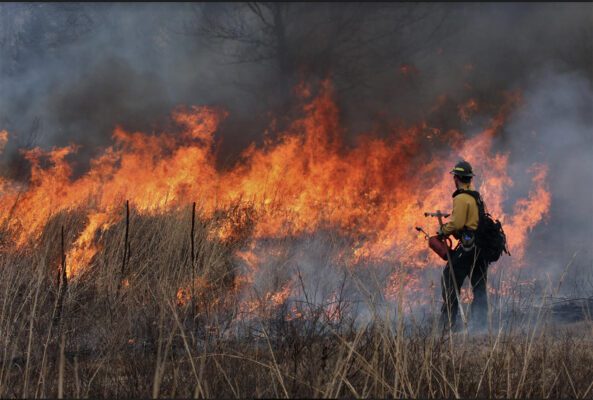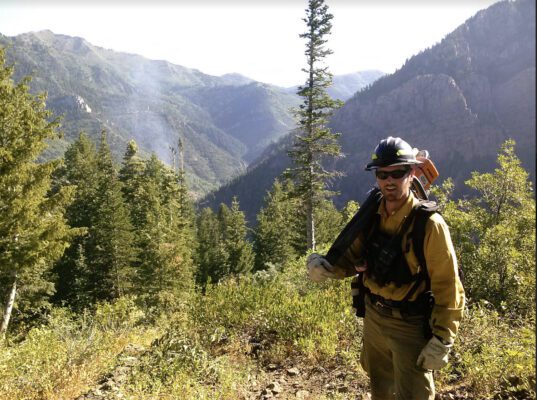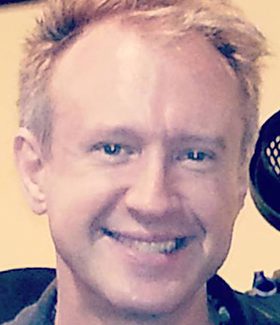Western Illinois University Alumnus Builds on Education to Become a Burn Boss
After graduating from Western Illinois University with his bachelor’s and master’s degrees in Recreation, Park and Tourism Administration (RPTA) in 2008 and 2010, alumnus Dale Maxson knew he wanted to work in land conservation.
A post-graduation job with the U.S. Fish and Wildlife Service in the Upper Peninsula of Michigan, a chance meeting, and the use of some knowledge gained in his Geographic Information System (GIS) classes, taught by WIU Professor Chris Sutton, eventually led to a new career path for Maxson. After more than 10 years of intensive training, Maxson has now achieved the title “Burn Boss,” becoming certified to command intentional and unintentional fire situations, such as wildfires or burning for land conservation.
While working at Michigan’s Seney National Wildlife Refuge as his first job after college, Maxson was putting together an interpretive program about the Whitefish Point migration stopover. While he was using his WIU-taught GIS skills to create a map for the program, the refuge’s fire manager took notice.

“He saw me using the software and he said he needed to know how to do that to organize some files he was working with,” said Maxson. “We began palling around and I became interested in his work in wildland fires.”
Maxson initially gained experience in ecological stewardship and the use of fire in land management while working with Horn Field Campus Program Director Mindy Pheiffer while he was a student.
“She gave me my first peek into the professional world of prescribed fire,” he said.
Maxson was a student employee at Horn Field Campus during his undergraduate years at WIU, managing natural resources ranging from the removal of invasive species and maintaining the site’s prairie. As a graduate student, Maxson was a graduate assistant at HFC, caring for the land at the site, as well as recruiting and using volunteers for larger tasks.
“The old saying is something about meeting certain people for a season or a reason,” said Pheiffer. “In my time at RPTA’s Horn Field Campus, I have met some extraordinary people. Dale Maxson and I crossed paths when he was new to Western and I was new to Horn. Over the years, I’ve come to greatly admire what he set out to do years ago, and what he has accomplished since.”
Pheiffer called Maxson “truly a man of the forest,” who is from a rural small town in Illinois, and who entered Western with the personal qualities of living by the Land Ethic as written by Aldo Leopold in the Sand County Almanac, which she said is required reading for most in outdoor education or natural resource management.
“He came to WIU’s RPTA department and coupled his personal qualities and beliefs of stewarding the land with knowledge and networks to reach a career goal,” she added. “As he advances at the Nature Conservancy, I watch in awe as he is doing what I have only studied. And he has become a lifelong friend to me and to the department.”

After Maxson’s seasonal position in Michigan was completed, he began to realize he needed additional leadership experience. He accepted a position as crew leader with the Conservation Corps in northwest Minnesota, which is where he was able to take his basic wildland firefighter training and learn what skills a firefighting crew should have.
Maxson then moved on to the Nature Conservancy of Minnesota, from 2012-13, as a preserve management assistant, and worked on a fire crew part of the season with prescribed fires.
“The landscape there was very interesting to me,” Maxson said. “It was a large remnant, which was more intact ecologically. It also allowed me to work on my plant identification skills.”
Maxson’s family was growing during this time and he and his wife, Elise, who worked in the same career field, had their first child. The couple was trying to decide what their next step would be.
“We didn’t want to compete with each other, so we put in as many applications as we could to find something that was a good fit for our family,” he said. “Whoever got picked first, that’s where we were going.”
Maxson’s successful application was for his current job with the Nature Conservancy at Land of the Swamp White Oak Preserve near Letts, IA. The region’s landscape presented a growing project with a lot of restoration potential in a habitat along the Cedar River. The site has increased from 1,500 to 4,500 acres during what Maxson called, “an exciting time to be a part of a project where we are able to address the threats to biodiversity.”
One of the goals of the Iowa property was to restore controlled fires and grazing in the area, and to deal with fragmentation and invasive species.
“We have a lot of different pressures,” Maxon said. “We don’t have many large, contiguous habitats in the Midwest and there are things to consider like people and roads in smoke-sensitive areas. We have to think about the future – we don’t want to be just good land stewards today, otherwise people are going to take our matches away.”
In November 2013, it became clear that the area needed to not only implement controlled burning, but also needed a burn boss to lead the fire efforts. At the time, the Nature Conservancy had to hire or contract out for the services, or ask for help from conservation partners, such as the U.S. Fish and Wildlife service.
“Hiring a burn boss didn’t make sense financially, so I made the decision to pursue that qualification myself,” Maxson said.
Building on his Basic Firefighter Type 2 training, Maxson moved on to Firefighter Type 1 (FFT1) which put him in supervision of small squads of firefighters. The next step was multiple Single Resource Boss positions (ENGB & FIRB) (training, which certified him to lead a fire crew. The next training level was to become an Incident Commander Type 4 (ICT4), which is responsible for the overall management of moderate complexity wildfires, and eventually a Prescribed Burn Boss (RXB2) which qualifies him to lead moderate complexity prescribed burns.
Each training level had its own set of classes and hands-on requirements and each took between two-three years to finish.
“We had task books, which are like merit badges in that you have to demonstrate your proficiency in the role before you are qualified,” Maxson said. “You have to find someone who is qualified to evaluate you based on a set of standards. During 12 years of working in this career, I encountered some burn bosses who stuck out in my mind and I wanted to be evaluated by them. I wanted to burn with those people also to gain their input as a leader.”
The training also required Maxson to travel around the country to gain knowledge and firefighting experience, as well as to be evaluated on what he learned. He also completed the training in addition to his regular job responsibilities.
His final certification came when he was invited to the Nature Conservancy in Georgia to finish up the evaluation process.
“I loaded up the family this winter and headed south,” he said. “It was a new landscape and it forced me to look at things differently. In a week, we burned almost 1,000 acres. There were also several high-value structures, like a mansion, that needed to be protected.”
In March, Maxson became certified as a RXB2 burn boss, a qualification that fewer than 1000 people in the U.S. have..
Maxson said he looks back fondly on his time at WIU and the lessons he learned that helped lead him to his chosen career path. He said it was the Environmental Conservation and Outdoor Education Expedition (ECOEE) trip of 2007 that assisted with that personal exploration.
“(ECOEE Coordinator) Jeff Tindall shaped the trajectory of my life,” Maxson said. “The ECOEE experience was great and showed me that leadership can look differently from person to person. He also showed me how to build that leadership.”
Maxson said he places a high value on the skills he learned during his time as a student at Western, including the leadership practices he saw modeled.
“I call upon those skills a lot and I wouldn’t change that,” he said. “I also learned that education is not done when you leave school.”
Maxson is now helping set up fire training classes in the region where he lives and works, and assisting with training fire community as a whole nationwide.
For more information about the RPTA program at WIU, visit wiu.edu/RPTA.









